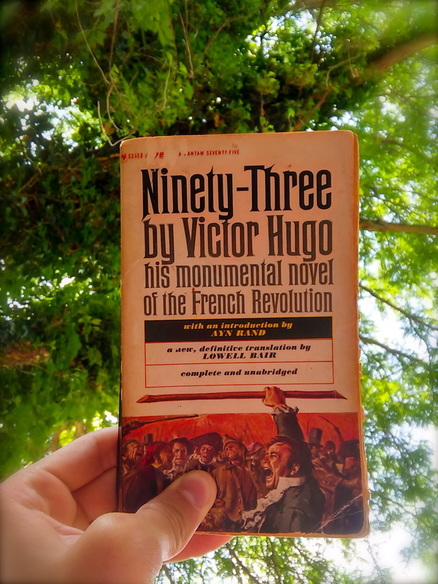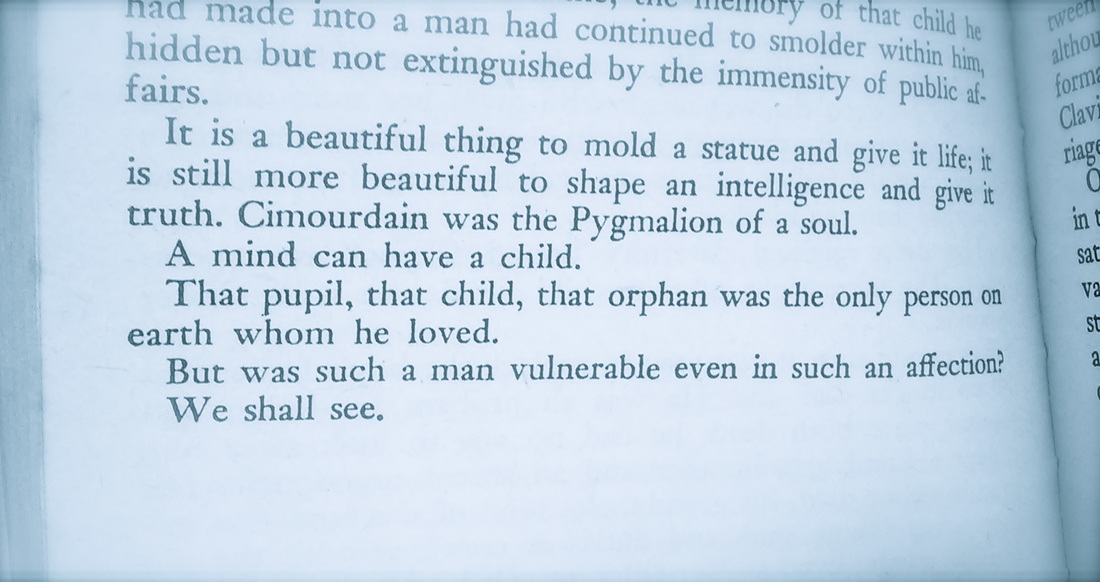"Have you ever wondered what they felt, those first men of the Renaissance, when- emerging from the long nightmare of the Middle Ages, having seen nothing but the deformed monstrosities of gargoyles of medieval art as the only reflections of man's soul-they took a new, free, unobstructed look at the world and rediscovered the statues of Greek gods, forgotten under piles of rubble? If you have, that unrepeatable emotional experience is yours when you rediscover the novels of Victor Hugo." - Ayn Rand, Introduction to Victor Hugo's Ninety-Three |

I really like Ninety-Three. I love Les Miserables. And I'm in love with Notre Dame de Paris. Their author, Victor Hugo {1802-1885}, is one of my favorite storytellers for two main reasons: his ability to plot a story and to humanize his characters. A lot of people I've met have heard of him and his most famous work, Les Mis, but it seems there's a big drop off when it comes to actual readers and fans. Maybe it's the fact that there are always musicals and adaptations to his works. Maybe it's finding a good English translation, or Hugo's sometimes daunting page-counts, or maybe the author is just buried beneath too many modern books of vampires and weak female characters. Whatever the reason, I feel compelled to introduce as many readers, especially young ones, to who Ayn Rand considered "the greatest novelist in world literature". Not because Ayn Rand said it, but because if you're anything like me, you're hungry for stories of heroes - complex ones - ones that breathe and think and act with conviction - ones who take themselves and their lives seriously - who fight against the greatest obstacles to win and defend their values. Ninety-Three is the perfect first course to tuck into before Hugo's greater main courses. At about 300 pages, the dramatic tale of the French Revolution - of a ruthless war between the royalists and the republicans - boasts a brevity and action that builds as decisively as - if not better than - any Ian Fleming spy thriller.
You won't get any plot spoilers from me, but I'll speak to the work's theme, which I found helpful in making sense of the heroism and tragedy enacted by the royalist and republican leaders, Lantenac, Gauvain, and Cimourdain, respectively. Working with Rand's definition of theme (in a literary sense), "the summation of a novel's abstract meaning", I think her formulation of Ninety-Three's theme is correct: "man's loyalty to values." Here, Hugo is not writing about which values one should adopt (he exalts and critiques both the royalists' and republicans' convictions). His emphasis is rather, in Rand's words, "What greatness men are capable of, when they fight for their values."
Moreover, Hugo isn't saying something time-specific to the French Revolution. He uses the tumultuous historic event as a setting by which men's loyalties to their chosen values are tested. He's focusing on the timeless - what can be abstracted from those specific historical events and characters - an idea he thinks is important: humans' fidelity to their convictions - especially in times when infidelity would be easier for them...
You won't get any plot spoilers from me, but I'll speak to the work's theme, which I found helpful in making sense of the heroism and tragedy enacted by the royalist and republican leaders, Lantenac, Gauvain, and Cimourdain, respectively. Working with Rand's definition of theme (in a literary sense), "the summation of a novel's abstract meaning", I think her formulation of Ninety-Three's theme is correct: "man's loyalty to values." Here, Hugo is not writing about which values one should adopt (he exalts and critiques both the royalists' and republicans' convictions). His emphasis is rather, in Rand's words, "What greatness men are capable of, when they fight for their values."
Moreover, Hugo isn't saying something time-specific to the French Revolution. He uses the tumultuous historic event as a setting by which men's loyalties to their chosen values are tested. He's focusing on the timeless - what can be abstracted from those specific historical events and characters - an idea he thinks is important: humans' fidelity to their convictions - especially in times when infidelity would be easier for them...
* * *
OTHER POSTS YOU MIGHT LIKE
* * *
{ * } HOWARD ROARK LAUGHED
{ * } JAMES BOND & HIS MAKER



















